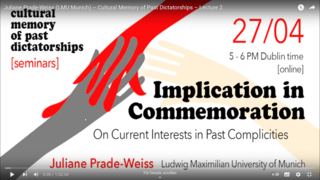Keynote "Implication in Commemoration: On Current Interests in Past Complicities"
at the conference
Cultural Memory of Past Dictatorships: Narratives of Implication in a Global Perspective
University College Cork/online, 27 April 2022
by Juliane Prade-Weiss
abstract
During the past 15 years, literatures from Central and Eastern Europe have been marked by a boom of (documentary) fiction portraying complicity with 20th century totalitarianisms. Texts such as Denemarková's 2006 Peníze od Hitlera ("Money from Hitler"), Jelinek’s 2008 Rechnitz, Müller’s 2009 Atemschaukel ("The Hunger Angel"), Topol’s 2009 Chladnou zemí ("The Devil’s Workshop"), Petrowskaja’s 2014 Vielleicht Esther ("Maybe Esther"), and Stepanova’s 2018 Памяти памяти ("In Memory of Memory") portray involvement in Nazi perpetration and Soviet or other terror. Since understanding the past serves requirements of the present, the boom prompts the question: Why the interest in past complicities now?
My hypothesis is that the texts address convergences between involvements in past acts of mass violence and current forms of participation in wrongdoings of humanitarian, political, ecological, or other natures in neoliberalism. While these issues differ profoundly, they are related in structural and historical terms: Structurally, both present the challenge of forming a nuanced notion of participation, the idea and promise at the heart of democracy, digital media, and consumer capitalism that is highly valued yet poorly conceptualized. Historically, both issues are related since justifications of past involvements have established the terminology, narratives, and heuristics in which terror, repression, and acts of mass violence are subsequently discussed by inscribing them into cultural traditions, thus forming the frame for negotiating current problematic involvements. The convergence of past and present complicities is of particular interest in view of the global crisis of political participation, which is currently undermined by an often unwilling but inevitable participation in detrimental structures that can be linked to the increasing delegitimization of democracy and the retreat to identitarian ideologies.
The implication of the "now-time" (Benjamin, SW4:395) marking the portrayal of past complicities is ambivalent: Past complicities may be paralleled with current problematic involvements to find models for comprehending issues of the present in cultural memory and/or to understand the genealogy of forms of social interaction. Yet this analytical approach is counteracted by hedonistic, or consoling, approaches, which evoke past complicities to appease the sense that all is not quite well, even after the demise of Nazi and Soviet terror, by drawing attention to how bad things have been, and grant distancing from historical and current involvements.
Literature is a privileged medium to explore this ambivalence as well as the issue of complicity because literary language relies, and reflects, on the audiences’ structural participation in the discourse: on readers to lend an eye, a voice, and an ear in reading or listening to a text, or watching a play. Fiction, moreover, depends on the audience’s suspension of disbelief, which mirrors the media studies notion that audiences are complicit in discourses if they uncritically accept the media’s representational claims. Interest of my analysis is not to denounce individual instances of complicity but to bring out what Kutz calls the "hidden promise of complicity," namely "the conception of community upon which it draws: a world where individuals shape their lives with others" (2000:259). In other words, thinking about complicity and implication (Rothberg 2019)—a subject one might rather not want to know about—is a good way of thinking about functioning participation and relationality.


